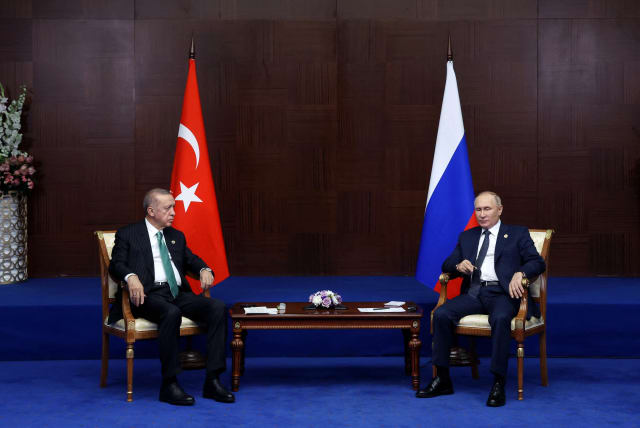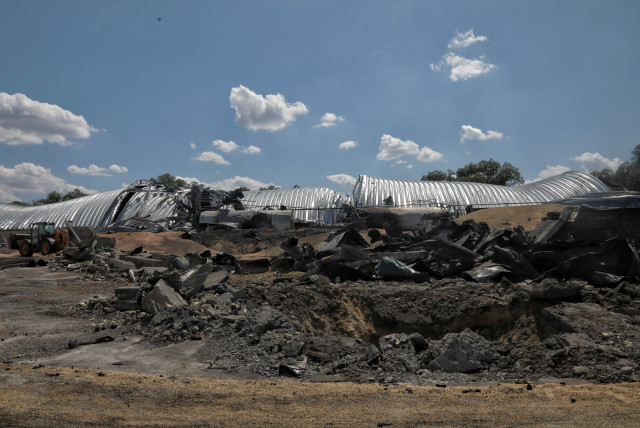Putin, Erdogan to discuss stalled Ukraine grain deal amid rising food prices

The halt of the Black Sea Grain Initiative, previously brokered by the UN and Turkey, has caused global food prices to surge after months of stability.
A UN index measuring global food prices has risen for the first time since April following the collapse of the Ukraine grain deal. Russian President Vladimir Putin is expected to meet with Turkish President Recep Tayyip Erdoğan later this month to discuss restarting the deal.
Turkey’s Hürriyet Daily News reported on Monday that Putin and Erdoğan spoke on the phone last week and agreed that Putin would visit Turkey at the end of August. A specific date has not been released.
After invading Ukraine in February 2022, Russia enforced a naval blockade, cutting off Ukrainian exports. The embargo caused a steep rise in prices for agricultural products. In July 2022, Russia and Ukraine signed the Black Sea Grain Initiative, an agreement brokered by the UN and Turkey to establish a safe shipping corridor and allow Ukrainian exports to resume. Last month, Russia pulled out of the agreement.
According to the report, Erdoğan and his Cabinet are discussing ways to resume the deal.
Global food prices continue to rise
On Saturday, the UN Food and Agriculture Organization released its monthly Food Price Index, which found that global food prices had risen 1.3% from June. The change, which the report attributed to “the Russian Federation’s decision to end implementation of the Black Sea Grain Initiative,” was the first increase in the index since April.
Farhan Haq, deputy spokesperson for the UN Secretary-General, described the grain deal as “indispensable” last month and said that it helped decrease food prices, which had risen dramatically following Russia’s invasion of Ukraine.
With global food prices now rising again, Putin has faced pressure to return to the agreement.
Aydin Sezer, a foreign policy analyst based in Ankara, said that Turkey’s reliance on Ukrainian grain makes the country especially invested in restarting the deal.
The disruption has been hitting Turkish flour mills hard, he said, increasing food costs in an economy already facing inflation.
Sezer said that resuming the grain deal would be a boon for Turkey and for Erdoğan.
“It will be Erdoğan’s diplomatic success, but more importantly, Turkey will be able to buy grain from Ukraine,” Sezer wrote in a message to The Media Line.
In another phone call earlier this month, Erdoğan called on Putin to restart the deal. According to a readout of the call, Erdoğan told Putin that suspending the grain deal would not benefit anyone and referred to the deal as a “bridge of peace.”
Last week, Russia attacked infrastructure that helped Ukraine export grain, including a major port.
Caroline Bain, chief commodities economist for Capital Economics, told The Media Line that she did not expect the agreement to resume. She noted that other factors were also driving the rise in grain prices, including weather and protectionist policies of some other countries.
Although supply has decreased, prices will probably stabilize around where they are now and are unlikely to return to the record highs they reached when Russia first invaded Ukraine, she said.
During last week’s phone call, Erdoğan said that Turkey would continue its diplomatic efforts to support the grain deal, noting that the rising grain prices resulting from the deal’s breakdown are hurting the poorest countries the most. According to the readout of the call, he also called on Russia to avoid further escalation in the war. “No one should take any steps that would increase tension,” he said.
Russia’s state news agency reported that Putin told Erdoğan that he blamed the West for the breakdown of the deal.
Last month, EU officials met to discuss ways to get grain out of Ukraine, such as sending grain by land to ports in Lithuania and the Baltics. Bain said that these measures would increase costs, causing problems, especially for North African countries like Egypt that rely on Ukrainian grain.
She said that Russia, which also exports grain, would likely ensure that its allies in Africa and the Middle East had an adequate supply.
“It doesn’t look good for Putin that he is potentially depriving more countries of basic food,” she said.
Jerusalem Post Store
`; document.getElementById("linkPremium").innerHTML = cont; var divWithLink = document.getElementById("premium-link"); if (divWithLink !== null && divWithLink !== 'undefined') { divWithLink.style.border = "solid 1px #cb0f3e"; divWithLink.style.textAlign = "center"; divWithLink.style.marginBottom = "15px"; divWithLink.style.marginTop = "15px"; divWithLink.style.width = "100%"; divWithLink.style.backgroundColor = "#122952"; divWithLink.style.color = "#ffffff"; divWithLink.style.lineHeight = "1.5"; } } (function (v, i) { });

